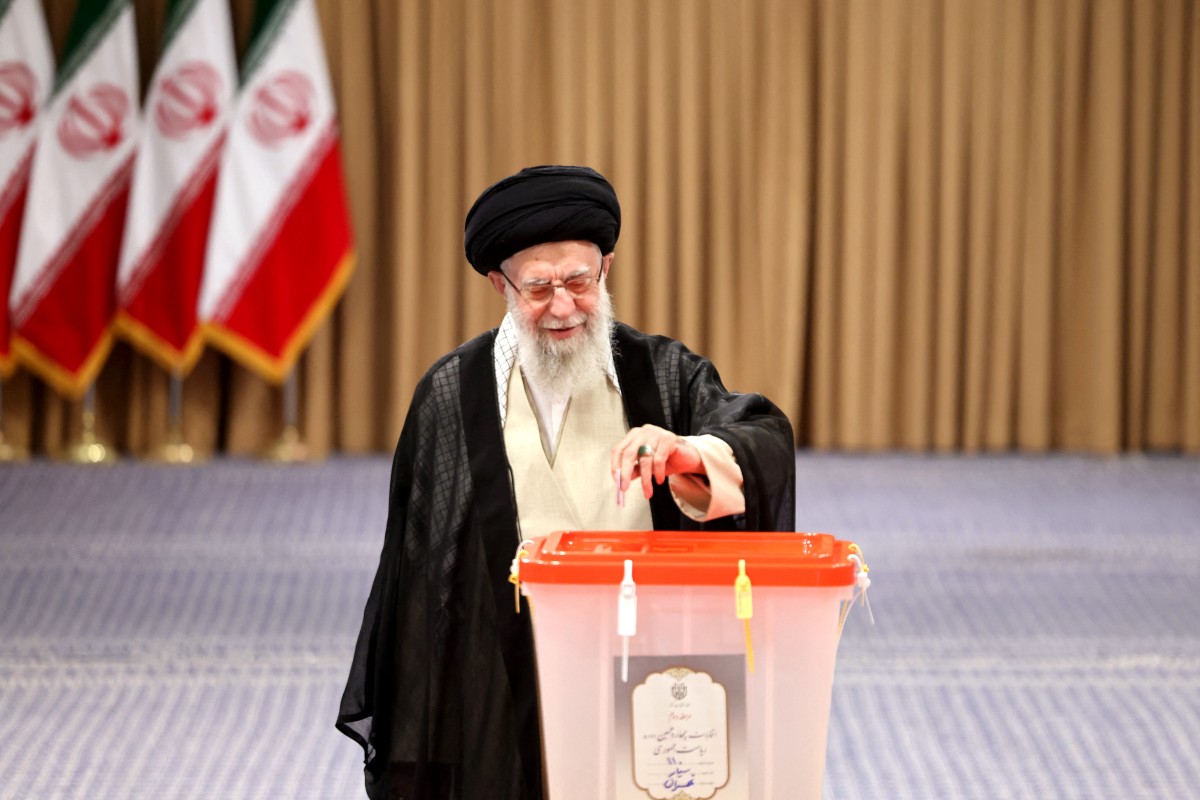Tehran, Iran – Iranians voted on Friday in a presidential runoff election where the choice is between a reformist advocating improved ties with the West and an ultraconservative former nuclear negotiator.
The election, called early after the death of ultraconservative president Ebrahim Raisi in a helicopter crash, follows a first round marked by a historically low voter turnout last week.
In a contest between reformist Masoud Pezeshkian and ultraconservative Saeed Jalili, the election comes amid heightened regional tensions over the Gaza war, Iran’s nuclear standoff with the West and widespread economic discontent exacerbated by sanctions.
Supreme leader Ayatollah Ali Khamenei, who has the final say in all state matters in the Islamic Republic, cast his ballot when polling opened in the morning.
“I heard that the enthusiasm and interest of the people is more than before, praise to God that it will be like this, and if it is like this, it will be gratifying,” he said.
State television showed voters queuing outside polling stations in Saveh in central Iran and Kerman in the south, while AFP correspondents said voting venues appeared less busy in Tehran.
In last week’s first round, Pezeshkian, who was the only reformist permitted to stand, won the largest number of votes, around 42 percent. In comparison, Jalili came second with 39 percent, according to figures from Iran’s elections authority.
Only 40 percent of Iran’s 61 million eligible voters took part — the lowest turnout in any presidential election since the 1979 Islamic Revolution.
Khamenei called for a higher turnout in the runoff, emphasizing the importance of the election.
He said the first round’s participation rate was lower than expected, but added that it was not an act “against the system”.
Low turnout
Khamenei called for a higher turnout in the runoff, emphasizing the importance of the election.
He said the first round’s participation rate was lower than expected, but added that it was not an act “against the system”.
The election was originally scheduled for 2025 but was brought forward by Raisi’s death in a helicopter crash in May.
Pezeshkian and Jalili have held two televised debates during which they discussed the low turnout, as well as Iran’s economic woes, international relations and internet restrictions.
At a Tehran polling station, 40-year-old Hossein said he voted for Pezeshkian who he believes “can make changes.”
“During his campaign, it seemed to me that he raises the crucial issues with honesty,” said Hossein, who gave only his first name.
Melika Moghtadaie, a 19-year-old university student who was wearing a black chador, said her preference was Jalili.
“I hope that Jalili, if he gets elected, will be able to help improve the country’s economy… as we expect,” she said.
The candidacy of Pezeshkian, a relative unknown until recently, has revived cautious hopes for Iran’s reformist wing after years of dominance by the conservative and ultraconservative camps.
Jalili, noted for his uncompromising anti-West position, rallied a substantial base of hardline supporters and received backing from other ultraconservative candidates.
While campaigning, the 58-year-old criticized moderates for having signed the 2015 deal which promised Iran sanctions relief in return for curbs on its nuclear program.
Jalili said the accord, which the United States withdrew from in 2018 under then-president Donald Trump, “did not benefit Iran at all”.
Pezeshkian has called for efforts to salvage the nuclear agreement and lift crippling economic sanctions.
The 69-year-old heart surgeon has advocated for “constructive relations” with Washington and European countries to “get Iran out of its isolation”.
‘Fed up’
Pezeshkian voted at a school west of Tehran where he was accompanied by former foreign minister Mohammad Javad Zarif, who helped clinch the 2015 nuclear deal.
A member of parliament representing the northwestern city of Tabriz since 2008, he has earned the support of Iran’s reformists, with former presidents Mohammad Khatami and Hassan Rouhani backing his bid.
Casting his ballot on Friday, Khatami urged Iranians to vote “for the future and good of the country”.
During one of their debates, the two rivals voiced dismay over turnout in the first round.
Pezeshkian said people were “fed up with their living conditions… and dissatisfied with the government’s management of affairs.”
Jalili has held several senior positions in the Islamic Republic, including in Khamenei’s office in the early 2000s.
He is one of Khamenei’s representatives in the Supreme National Security Council, Iran’s highest security body.
Jalili voted in the second round at a mosque in Qarchak, south of the capital Tehran.
Regardless of the result, Iran’s next president will be in charge of applying state policy outlined by the supreme leader, who wields ultimate authority in the country.







